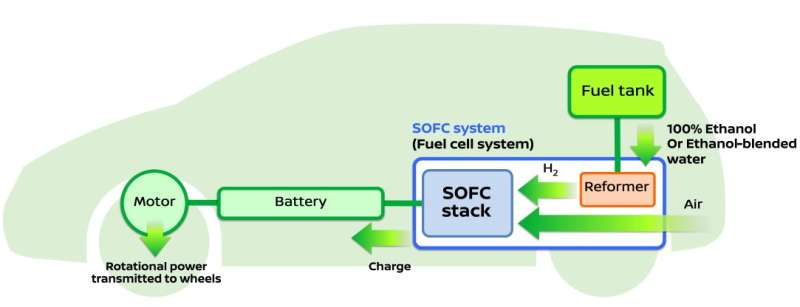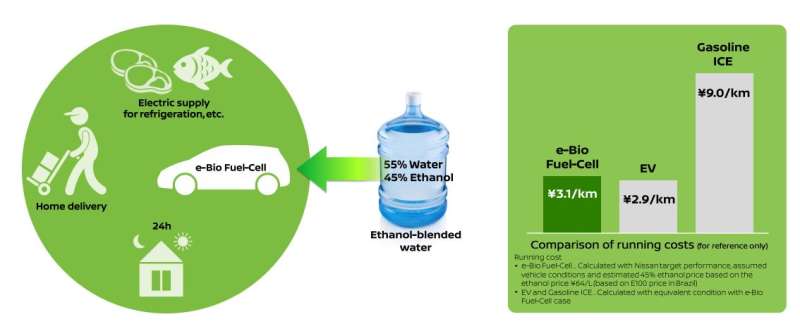June 16, 2016 weblog
Nissan is working on bio-ethanol system for vehicles

Nissan is developing a bio-ethanol fuel cell system. This is an auto industry first, said headlines.
Carl Anthony, managing editor of Automoblog, weighed in on what is special about Nissan's development. This is a unique fuel cell known as a Solid Oxide Fuel-Cell (SOFC), he said, running on bio-ethanol electric power, with an e-Bio Fuel-Cell and an SOFC power generator.
SOFC?
Anthony wrote that the SOFC harnesses fuels such as ethanol and natural gas, with oxygen to create electricity. The Engineer took this further: "The e-Bio Fuel-Cell utilizes hydrogen transformed from fuel via a reformer and atmospheric oxygen, with the subsequent electrochemical reaction producing electricity to power the vehicle."
CO2 emissions? Anthony said, "When a fuel cell generates power, CO2 is usually emitted, but with the bio-ethanol system, CO2 is neutralized through the sugarcane in the bio-fuel."
Another advantage is that, unlike electric vehicles, "it takes a very short time to refuel the solid oxide fuel cell-powered car," said E&T. Luke Edwards in Pocket-lint similarly noted that such a fuel system can be filled faster than pure electric using current pump systems.
What about general availability of bio-ethanol fuels?
The fuels, including those sourced from sugarcane and corn, are widely available in countries in North and South America, and Asia, said The Engineer. What is more, E&T said "the sugar-cane and corn-growing regions could economically expand if the technology became widespread with no extreme requirements for new infrastructure, which is needed to handle hydrogen for other types of fuel-cell powered cars."

Commented Jimi Beckwith in Autocar: The localized nature of the sugar cane and the CO2 cost of transporting fuel mean that markets close to the equator are the most likely to see the engine in commercial production first.
A Reuters report said, "Ethanol is used as a fuel source for vehicles in countries including Brazil, but Nissan is planning to use it to generate electricity in fuel cell stacks to charge batteries which would power vehicle motors."
Range? Edwards said it offers "an impressive 600km range on a tank." E&T said the 600km driving range was equivalent to a conventional gasoline-powered car.
So what's next? Pocket-lint said, "At the moment Nissan is simply working on the tech but we'd expect to see more advances soon."
Automoblog's Anthony commented that Nissan is ultimately pushing for zero-emission, zero-fatality driving.
Certainly, the U.S. has eyed benefits of fuel cell technologies for transportation as well. The National Renewable Energy Laboratory of the Department of Energy has talked about potential to revolutionize "our transportation system."
The lab stated that "Fuel cell electric vehicles (FCEVs) fueled by hydrogen are poised to play an important role in our nation's portfolio of sustainable transportation options. FCEVs offer long ranges and fast refueling, and emit only water vapor."
Advantages are that vehicles with such systems are more efficient than conventional internal combustion engine vehicles and produce no harmful tailpipe exhaust—they emit water vapor and warm air. In their own words, they "are working to unlock the potential of hydrogen as a fuel and to advance fuel cell technologies for automobiles, equipment, and buildings."
The site stated that "The U.S. Department of Energy is leading government and industry efforts to make hydrogen-powered vehicles an affordable, environmentally friendly, and safe transportation option."
More information: www.newsroom.nissan-europe.com … .aspx?mediaid=147166
© 2016 Tech Xplore















